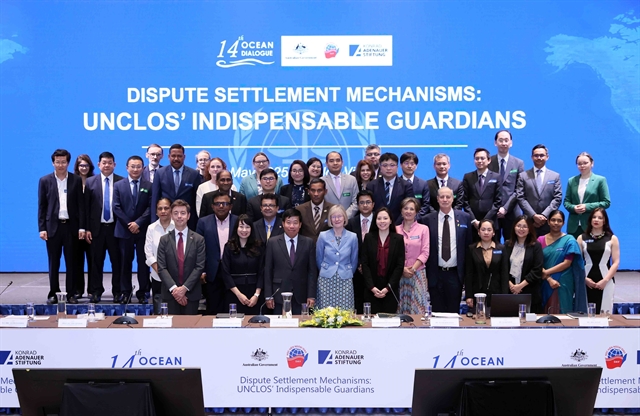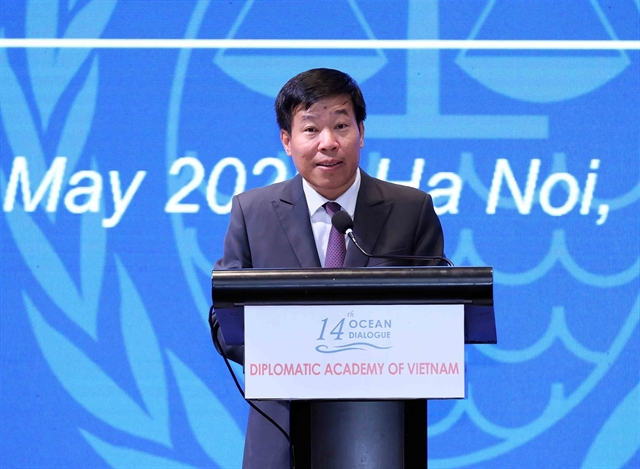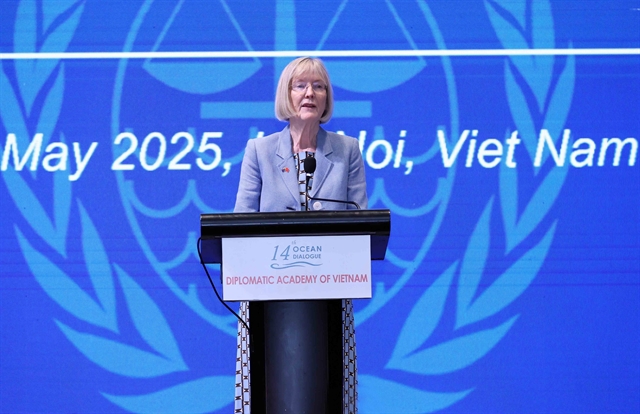 Politics & Law
Politics & Law


|
| Delegates participating in the 14th Ocean Dialogue in Hà Nội on May 7. — VNA/VNS Photo An Đăng |
HÀ NỘI — Việt Nam has reaffirmed its commitment to the United Nations Convention on the Law of the Sea, as well as handling maritime disputes in a peaceful manner.
Member of the Party Central Committee and Deputy Foreign Minister Nguyễn Mạnh Cường made the statement on Wednesday at the 14th Ocean Dialogue themed 'Dispute Settlement Mechanisms: UNCLOS' Indispensable Guardians' held in Hà Nội.
Việt Nam's successful, peaceful and legal negotiations on maritime boundaries with neighbouring countries, including China, Indonesia, Malaysia and Thailand, proves that adhering to international legal principles "is not just the right path, it is the smartest strategic choice for our national and regional interests," the diplomat stressed.
"In a world increasingly shaped by climate change, environmental challenges and resource scarcity, UNCLOS Dispute Settlement mechanisms provide nations with practical tools to collaborate on long term ocean governance," Cường noted. He added that these tools provided help us navigate critical issues such as rises in sea levels, sustainable management of maritime biodiversity, and responsible use of seabed resources – issues central to the survival and prosperity of future generations.

|
| Vietnamese Deputy Minister of Foreign Affairs Nguyễn Mạnh Cường delivered the keynote speech at the 14th Ocean Dialogue in Hà Nội on May 7. — VNA/VNS Photo An Đăng |
He called UNCLOS and the International Tribunal for the Law of the Sea (ITLOS) a visionary step towards greater international harmony and order at sea, and ITLOS exemplifies a "progressive and civilised approach to dispute resolution, providing a peaceful and rational alternative to conflict and force."
Cường said: "UNCLOS offers not merely a legal framework but also a powerful vehicle for peace. It encourages nations to resolve differences, to dialogue, respect and adherence to international law for nations essential for global maritime security, peace, and sustainable economic development
“UNCLOS is indeed the constitution of the oceans, and its dispute settlement mechanisms—particularly ITLOS—are the indispensable guardians of international maritime order," he said, calling on every relevant party to "support, use and strengthen these institutions" to build a future where our oceans remain a space of peace, stability and prosperity grounded firmly in the rule of law.
At the meeting, Australian Ambassador to Việt Nam Gillian Bird reiterated her country's firm belief in peaceful resolution through law.
“Australia has always pursued a world where differences and disputes are settled peacefully in accordance with rules and norms, and not by force, power or size,” she said.
Noting the global stakes in maritime stability, especially in the South China Sea (known in Việt Nam as the East Sea), Ambassador Bird stated that Australia and Southeast Asian economies are deeply connected with each other and rest of the world.
“A large proportion of global trade transits the South China Sea. We all rely on sea routes for our trade. For these reasons, peace and stability in the maritime domain and freedom of navigation are critical to us all, and adherence to UNCLOS as the legal framework protecting these activities in the oceans and seas is vital.”

|
| Australian Ambassador to Việt Nam Gillian Bird addresses the 14th Ocean Dialogue on May 7. — VNA/VNS Photo An Đăng |
However, she expressed concern over “aggressive and coercive conduct" in the South China Sea and the threats posed to “undersea cables, coastal communities, and the marine environment through illegal, unregulated and unreported fishing," which highlighted the need for lawful and peaceful resolution of disputes.
Highlighting Australia’s direct experience with UNCLOS dispute mechanisms, Bird shared the country’s journey through the first-ever conciliation process under UNCLOS with Timor-Leste: “Australia argued that the Conciliation Commission did not have jurisdiction... however, we made it clear from the outset that we would abide by the Commission’s decision no matter what it was.”
This, she said, exemplifies what it means to uphold international law—“accepting rulings even when they don’t go our way.”
She also called attention to the 2016 South China Sea arbitration ruling between the Philippines and China, stating firmly that “the findings are final and binding on the parties” and reaffirmed Australia’s support for compliance with international rulings.
"We cannot simply ignore rulings we don't like. We must speak up when they are ignored to ensure UNCLOS and the international rules on which we all rely are not weakened," the Australian said.
The 14th edition of the Ocean Dialogue, held in Hà Nội by the Diplomatic Academy of Việt Nam, in partnership with the German NGO Konrad-Adenauer-Stiftung (KAS), brought together diplomats, legal scholars and maritime experts from around the world for a critical discussion on dispute settlement mechanisms under the UNCLOS. With UNCLOS marking the 30th anniversary of its entry into force and the ITLOS approaching its own 30th anniversary in 2026, the conference served as a timely reflection on the past, present and future of international maritime dispute resolution.
The Vice President of the Diplomatic Academy of Việt Nam (DAV), Dr Nguyễn Thị Lan Anh, underscored the enduring value of UNCLOS, calling it “a defining moment in the international community’s effort to establish a coherent legal framework for the sustainable and peaceful use of the seas.”
Olivia Schlouch, Programme Manager of the KAS Rule of Law Programme Asia, expressed strong support for Việt Nam’s growing role in international maritime law.
“We proudly support Associate Professor Dr Nguyễn Thị Lan Anh in her candidacy as Việt Nam’s first ever nominee for Judge at ITLOS. Her candidacy is not only a recognition of her personal expertise but a testament to Việt Nam’s growing leadership in maritime legal affairs," the Programme Manager said.
The discussions at the 14th Ocean Dialogue were divided into four sessions: an overview of the historical foundations and legal development of UNCLOS Dispute Settlement mechanisms, their contributions to peaceful resolution of maritime disputes, how judicial interpretation have helped develop the International Law of the Sea, and the final session looked to the future, considering it might adapt to emerging challenges like climate change, deep sea mining and rising sea levels. — VNS




